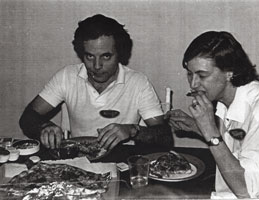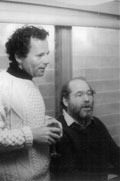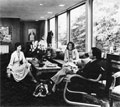
Founder, General Director & Trustee 1975-82
How It Started
At a poker table in New York: The players were Herb Grossman, his wife, Anne, and their very good friends from Pittsburgh, Joan and Jerry Apt. The refreshments varied from excellent Champagne to New York City’s best pizza. The card playing and conversation went on for a couple of years.
Herb Grossman had been the associate conductor of the Pittsburgh Symphony Orchestra where he befriended the Apts. He was the music director of two of my productions: Voices, three one-act operas by Charles Strouse staged in New York and featuring Madeleine Kahn, Clifton Davis, Victoria Jackson and Barbara (friend of Herb’s); and Fiddler On the Roof starring Leonard Nimoy on an extensive tour during the summer and fall of 1972.
The conversations at the poker table and elsewhere often turned to my expressing ideas for creating a new theater devoted to innovative, open staging, new plays and as close to working in repertory as possible. Joan Apt expressed her ambition to find a way to bring live theater back to Pittsburgh. Joan managed to attend the productions I was directing at the time and then she initiated discussions about prospects of my considering Pittsburgh as a place to create my theater.
Throughout 1974 I visited Pittsburgh to meet with the leadership of the community: political, corporate, philanthropic, artistic and educational. But the most important meeting that Joan set up was with Margaret Reick. She matched Joan in dynamism and knowledge of her part of the Pittsburgh community. Most importantly these included her relationships at the highest level of state and city government. She certainly shared the vision and practical steps needed to bring a new theater company into being. As Joan was a central figure from the moneyed Jewish community and a longtime prime supporter of the Pittsburgh Symphony, so Margaret was a leading figure from the suburban, wealthy and Wasp community who had expertise in both the theater and in raising money. Clearly the two of them had their own brand of genius, charm and unflagging energy. They gave me every confidence that if I could sell my theatrical ideas to the community and provide a realistic business case to the money sources in Pittsburgh and outside, our theater would see the light of day.
Pessimism was very high among the local and national theater cognoscenti that Pittsburgh could or would support a substantially funded and artistically adventurous theater. Because after establishing his American Conservatory Theater in 1965-66 at the Pittsburgh Playhouse, William Ball lost the confidence of the community and was forced out. He moved on to San Francisco where A.C.T flourished as one of the world’s great theater companies. A rather mean-spirited verbal coup de grace to the situation was offered by the actress Ruth Gordon when she said in an interview, “Let’s face it, son. Meaning no disrespect, Pittsburgh never was much of a theater town.”
How did it begin to change? Hazlett, Doty and the “Shuberts” were the first movers. They primed the funding pumps. Ted Hazlett was chairman of one of the many Mellon foundations in Pittsburgh and considered the first and foremost arbiter of what was and was not bullshit where theater was concerned. His foundation had been badly burned by the William Ball disappointment because it more than generously fronted A.C.T.’s Pittsburgh experience. Ted and I liked each other. He liked that I would not under any circumstances agree to present our first season at the Pittsburgh Playhouse. He called it throwing new money after bad memories. And he gave what was then becoming known as the Pittsburgh Public Theater his imprimatur by promising “last money” so that we would be guaranteed to more than meet our fundraising goal. And he did just that.
Arthur M. Doty, called Murph, was the chairman of the Alcoa Foundation and a wily, disciplined business leader of the city’s charitable community. Murph told Joan, Margaret and me that if “we kept the total number of our first season’s budget under $400,000” the Alcoa Foundation would become our first very significant fundraising victory. We did. It did.
The Shuberts, in the persons of Bernard Jacobs and Gerald Schonfeld, were by far the most influential theatrical management force in the country. They were President and Chairman, respectively of the Shubert Foundation. In the early 1970s the Shuberts and all other producers were mourning the terrible state of business affairs for the Broadway theater, as well as for road shows throughout the country. So Bernie and Gerry tried every means to invigorate the art form they loved. Investing in new playwriting projects; leading the cleaning-up of the Broadway/Times Square streets; and in learning how they could cooperate with the very new regional theater movement to spur excellent work.
In 1974-75, securing a grant from it was a daunting enterprise. They had never granted one to a company for its first season. I had come to know Bernie and Gerry during many production pitches, national conferences and shared storytelling. They knew the details of my hopes and dreams for a theater in Pittsburgh. They very much knew about the decline in theatrical life in Pittsburgh because at one time the Nixon was owned and operated by the Shubert Organization. They wanted to believe the city could come back as a theater town. They had the Shubert Foundation scrutinize my business plan and plans for repertory for the first season – and for the following two seasons if we could manage to get the first one up and running. The Pittsburgh Public Theater received a Shubert Foundation grant. More than any press notice, public relations or salesmanship on our part, this action by The Shuberts made the professional theater community throughout the US begin to pay attention to what was about to happen in Pittsburgh.
On September 17, 1975, it happened.




